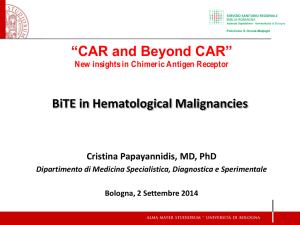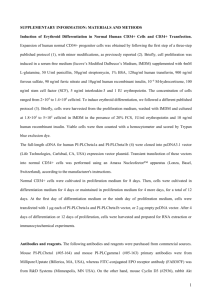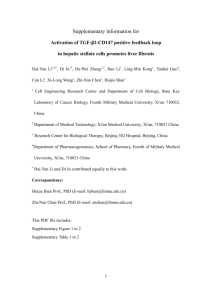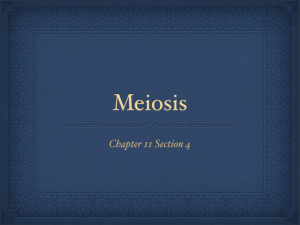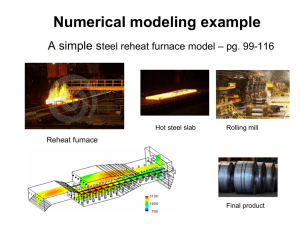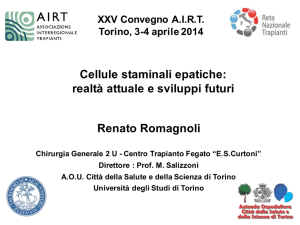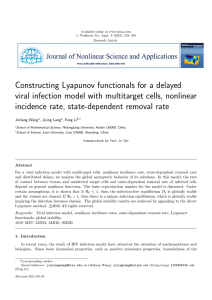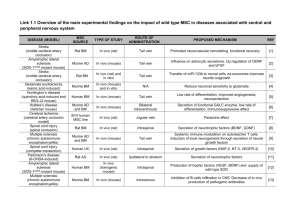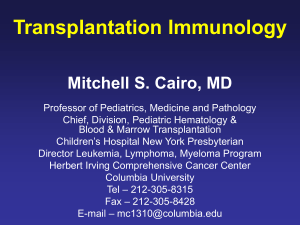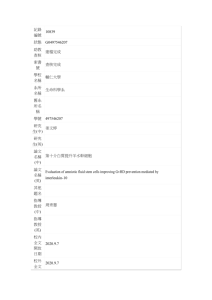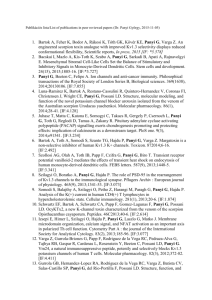R. CARSETTI
advertisement
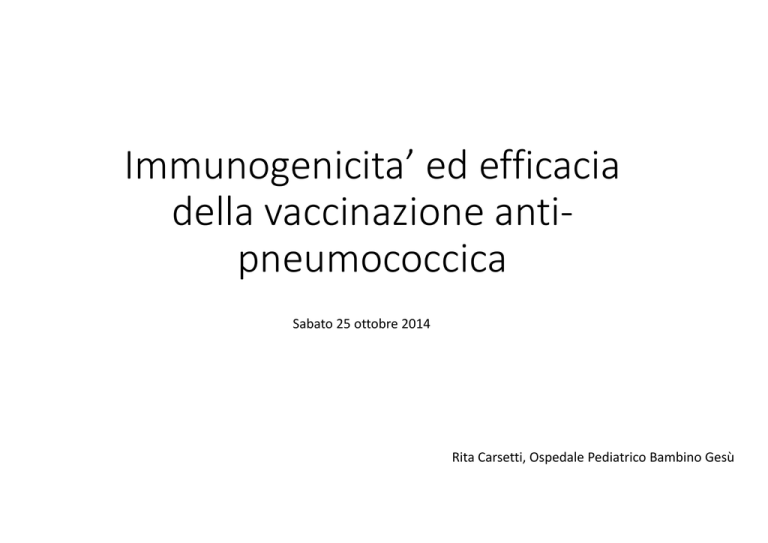
Immunogenicita’ ed efficacia della vaccinazione anti‐ pneumococcica Sabato 25 ottobre 2014 Rita Carsetti, Ospedale Pediatrico Bambino Gesù minutes hours days minutes memory T memory B hours plasma cell days RISPOSTA T- DIPENDENTE protein antigens day 3 day 7 day 14 Memory B cells plasma cells extra-follicolar phase germinal center reaction PERIPHERY primary BM booster RISPOSTA T- INDIPENDENTE Polysaccharide antigens Extrafollicular response Non genera memoria PERIPHERY primary BM booster The increased susceptibility to mucosal infection in infancy is due to the lack of memory B cells. proteine RISPOSTA T- DIPENDENTE carboidrati RISPOSTA T- INDIPENDENTE T IgG IgM ANTIGENE GLICOCONIUGATO TRASFORMA UN T ANTIGENE T‐INDIPENDENTE IN T‐DIPENDENTE IgG The increased susceptibility to infection of splenectomized individuals is due to the lack of memory B cells Kruetzmann et al., J Exp Med 2004 Children 21 splenectomized 19 controls Adults 57 splenectomized 47 controls thalassemia spherocytosis spherocytosis trauma trauma congenital non-haemat. neoplasia other Normal anti‐pneumococcal antibody levels in splenectomized individuals ADULTS CHILDREN Le IgM memory sono molto poche nei pazienti splenectomizzati. Per questo le risposte T‐indipendenti sono assenti . In questi casi però si possono indurre le cellule B MATURE A fare anticorpi somministrando i vaccini coniugati, dopo la splenectomia T IgG Down Syndrome is associated to an increased frequency of infection, autoimmunity and leukemia. Immunodeficiency is an integral part of the syndrome Elderly patients an increased risk of pneumococcal infection. Why? Do they lose memory B cells? CLP CD4 CD8 70% CD4 memory CD8 memory 50% 50% 30% 14% 12000 10000 8000 6000 Controlli pre Controlli post 4000 2000 0 IgA IgM IgG totali 12000 10000 8000 6000 Down pre Down post 4000 2000 0 IgA IgM totali IgG pneumo flu 700 600 500 400 controls 300 200 100 0 Pneumo IgA IgM IgG flu IgA IgG flu pneumo 700 IgM 600 500 400 Down 300 200 100 0 Pneumo IgA IgM IgG flu IgA IgM IgG IMMUNOLOGICAL MEMORY IS THE PROPERTY OF THE IMMUNE SYSTEM OF RECOGNIZING AND NEUTRALIZING A PREVIOUSLY ENCOUNTERED PATHOGEN THEREBY PREVENTING INFECTION AND DISEASE IgM memory Memory B cells Switched memory antibodies Long‐lived plasma cells Each vaccination leaves a permanent imprint in the immune system, embodied by memory B cells, long lived plasma cells and their antibodies. …but do vaccinations influence other cells of the immune system? We have studied the immune system of 70 children before and after influenza vaccination Pre (median, range) Post (median, range) p value B cells (% of lymphocytes) 23.5 (9.7‐49.6) 19.6 (11.6‐44.9) 0.128 Memory B cells (% of B cells) 12.8 (3.4‐25.5) 12.6 (4.3‐26.9) 0.805 Mature B cells (% of B cells) 44.2 (31.9‐59.1) 46.6 (29.5‐55) 0.603 Transitional B cells (% of B cells) 9.9 (1.6‐29.8) 9.8 (3.2‐31.6) 0.568 IgM memory B cells (% of B cells) 6.7 (1.8‐15.2) 5.6 (2.2‐13.5) 0.045 Switched memory B cells (% of B cells) 6.7 (1.4‐18.7) 6.6 (2.4‐20.4) 0.381 NK cellsa (% of lymphocytes) 3.8 (1.1‐13.8) 4.15 (1.3‐16.3) 0.08 NKT cellsb (% of lymphocytes) 1.3 (0.4‐10) 3.15 (0.5‐9) 0.09 T cells (% of lymphocytes) 67.2 (41.5‐83.4) 69.5 (45.6‐82.5) 0.099 CD4 T cells (% of CD3pos cells) 59.7 (42.7‐72.3) 58.25 (35.5‐74.7) 0.163 CD8 T cells (% of CD3pos cells) 30.7 (17.9‐44.1) 30.95 (19‐54.4) 0.382 IgG anti‐Vaxigrip AFCsc (spots/106 cells) 50.3(0‐2142) 112.6 (0‐1661) 0.001 IgG anti‐Texas AFCsc (spots/106 cells) 45.0(0‐2742) 62.5 (0‐485) 0.344 60 (0‐960) 335 (10‐3579) <0.001 203.5 (0‐601) 463 (0‐640) ? IgM anti‐Vaxigrip ASCsa (spots/106 cells) IgM anti‐Texas ASCsc (spots/106 cells) In children influenza vaccination does not have any measurable effect On the frequency and distribution of B, T, NK and NK T cells. Further studies 1. Down syndrome 2. Elderly individuals 3. HPV girls and boys Manuela Rosado Marco Scarsella Simona Cascioli Ezio Giorda Federica Capolunghi Alaitz Aranburu Valentina Marcellini Eva Piano Mortari OpBG Alberto Ugazio Alberto Tozzi Franco Locatelli Luciana Nicolosi Alberto Villani Diletta Valentini S.Matteo, PV Antonio Disabatino Gino Corazza GRAZIE Area di Immunologia
